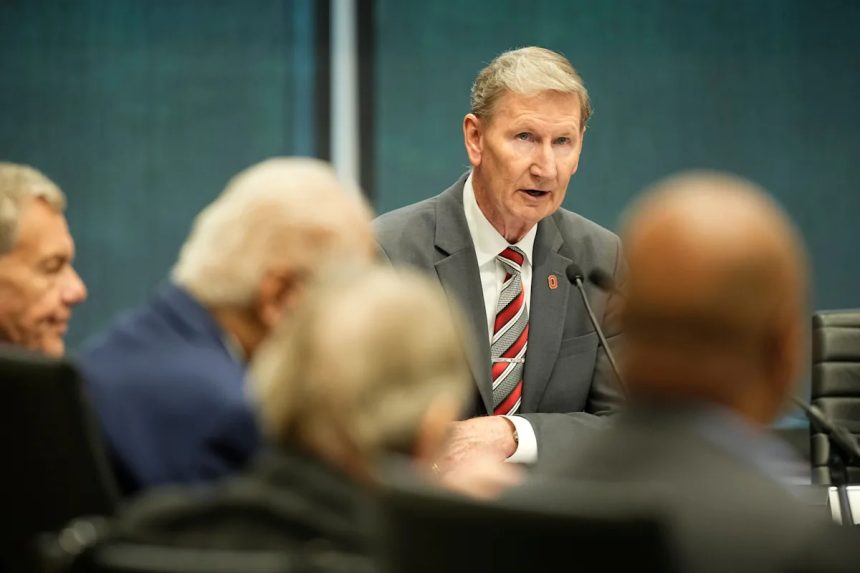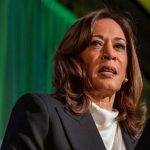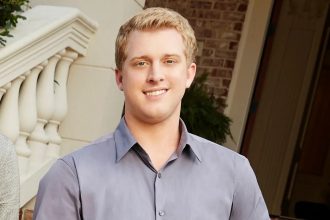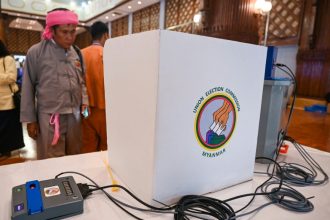WASHINGTON – Even as his school and other universities across the nation face increasing scrutiny from the Trump administration, the Ohio State University President Ted Carter doesn’t feel targeted by the federal government.
The land-grant university is one of dozens facing federal inquires tied to antisemitism on campus. Carter said he believed the school was included in the probe due to previous investigations launched under the Biden administration.
“I always tell my staff and all my people, if we do the right thing, we stick to our mission, everything will work out,” Carter told USA TODAY. “So if somebody wants to come take a close look at us or ask us why we’re doing certain things, we welcome that.”
The university is also facing a separate probe tied to Project PhD, a program aimed at helping some minority students obtain business doctorates. Ohio State spokesperson Ben Johnson said the university has sent its response to investigators and has not heard back. He added the doctorate programs are open to all and the university “does not discriminate on the basis of race, ethnicity or any other protected class.”
President Ted Carter gives a report during the Ohio State University Board of Trustees meeting at the Longaberger Alumni House on Aug. 20, 2025.
Carter visited the USA TODAY newsroom while in Washington, D.C. to meet with staffers from the Ohio congressional delegation and Ohio State alumni working on Capitol Hill. He leads a university in a solidly red state, which presents challenges for academic independence as Republicans, at the state and federal level, along with the president of the United States, work to remake higher education.
And though he seems unworried about federal attention, he is facing pushback from some faculty and staff who question his approach on diversity issues and say he’s overreacting.
Carter’s approach to these contentious issues seems to be acceptance of the laws he can’t change, while trying to get ahead of them on the university’s terms.
He was president when Ohio legislators passed Senate Bill 1, a sweeping higher education law in February that restricts universities from offering diversity, equity, and inclusion programs. It also bars faculty from striking and prevents institutions from taking a stance on controversial beliefs or policies – defined in the law as “ climate policies, electoral politics, foreign policy, diversity, equity, and inclusion programs, immigration policy, marriage, or abortion.”
Whereas some of the public colleges protested a similar bill in 2023, Ohio State did not publicly oppose Senate Bill 1. Carter said it was clear based on the makeup of the state legislature that the bill was going to pass. Flat out opposing it, he said, would have meant losing an “opportunity to have a discussion about some of the changes that we thought would be best made.”
He said he had access to lawmakers in the lead-up to the bill’s passage and was able to push for universities to retain autonomy in how they comply with laws. He added the university tried and failed to retain the ability of student trustees to vote in board meetings.
Navigating free speech concerns
Carter has also faced criticism from faculty and students when the university shut down two centers tied to diversity efforts ahead of the SB1. The university has also cracked down on chalking on campus sidewalks, which critics say impedes the free speech rights of students. It also restricted how resident advisers can decorate common areas in dorms to school friendly themes.
Regarding the centers, Ohio State has said the closures were tied to Trump’s anti-DEI directives. Carter said many have focused on the center’s closures but not on what’s now in their place. He mentioned the Buckeye Commons, which replaced the center for social belonging. It offers career, financial and mental health resources to students. He added no students lost scholarships because of the centers’ closures.
“Is it perfect? No,” Carter said. “But we’re still working on getting some of this put together and we have made some hires to build out those spaces.”
As for the chalking, Carter said the decision to bar it was more an administrative issue than an attempt to curtail speech. The issue first came up during student protests tied to the Israel-Hamas war in October 2024. Much of what appeared on sidewalks had to be reviewed by lawyers before it could be removed.
“It would sit there on the sidewalk for hours, almost looking like we were endorsing it,” he said. “That became a serious administrative burden, and one that did not reflect what I believe was the right thing for the university.”
Carter added that other universities like Harvard or the University of Maryland had similar rules.
He also described the dorm decision as a little bit out of an “outgrowth of SB 1.” He said the goal was to make sure “our public facing spaces don’t become people’s personal place for where they want to express themselves.” Johnson sent a follow-up message adding the change also stemmed from a university review tied to changing state and federal regulations.
These free speech challenges come at a time of increased concern over the First Amendment rights of students.
A new report released Sept. 9 by the Foundation for Individual Rights and Expression found that more than half of the 257 surveyed colleges and universities failed to create environments friendly to free speech. The report also found that a majority of students were opposed to allowing an array of hypothetical, controversial figures from the left and the right.
Ohio State placed 124th overall in the rankings. The report found of the 329 Ohio State students who responded, 43% reported self-censoring on campus.
New civic center debated
At the same time, the university recently opened a civics center as required by a 2023 state law. It’s named after former Ohio governor, senator and chief justice Salmon P. Chase. Its stated mission is to “conduct teaching and research in the historical ideas, traditions, and texts that have shaped the American constitutional order and society.”
These types of centers, which are popping up around campuses nationally, are popular among conservative politicians and are often cited as a counter response to what they describe as decades of liberal indoctrination on college campuses. Critics say these centers are overly right-wing and lack academic rigor. At Ohio State, faculty voted against the center, though their approval was not required for it to open.
Carter disagreed with the assessment that civic centers are the right-wing version of DEI centers on campus. Instead, he said he envisioned the center as a space for “rigorous debate.”
“It’s not a forced slant to the conversation,” he said.
This article originally appeared on USA TODAY: How Ohio State’s president is navigating higher education under Trump









